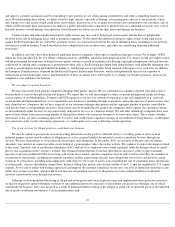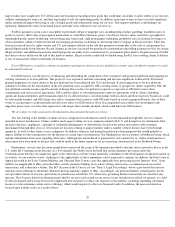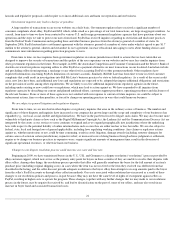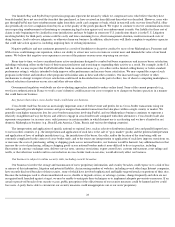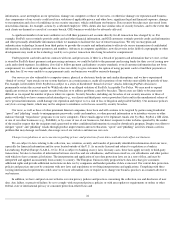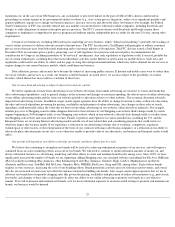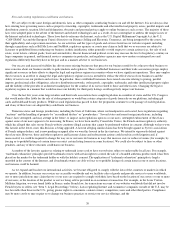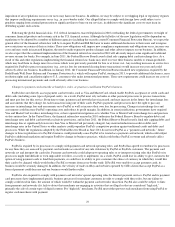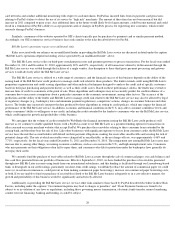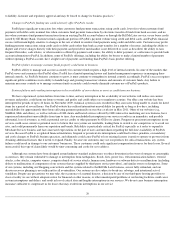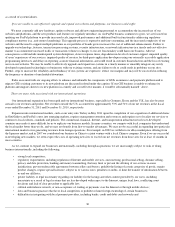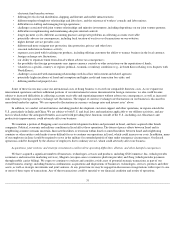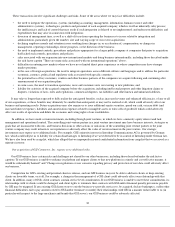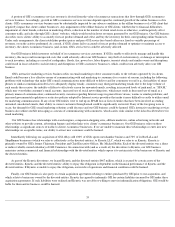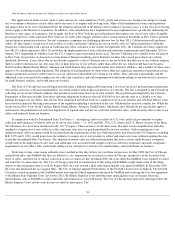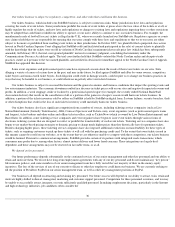eBay 2011 Annual Report Download - page 32
Download and view the complete annual report
Please find page 32 of the 2011 eBay annual report below. You can navigate through the pages in the report by either clicking on the pages listed below, or by using the keyword search tool below to find specific information within the annual report.
imposition of any regulations on us or our users may harm our business. In addition, we may be subject to overlapping legal or regulatory regimes
that impose conflicting requirements on us (e.g., in cross-border trade). Our alleged failure to comply with foreign laws could subject us to
penalties ranging from criminal prosecution to significant fines to bans on our services, in addition to the significant costs we may incur in
defending against such actions.
Following the global financial crisis, U.S. federal lawmakers enacted legislation in 2010 overhauling the federal government's oversight of
consumer financial products and systemic risk in the U.S. financial system. Although the full effect of the new legislation will be dependent on
regulations to be adopted by a number of different agencies (including the recently created Consumer Financial Protection Bureau), we expect the
general effect of the financial reform law will be to require PayPal and Bill Me Later to make additional disclosures to their users and to impose
new restrictions on certain of their activities. These new obligations will impose new compliance requirements and obligations on us, increase our
costs and may result in increased litigation, the need to make expensive product changes and other adverse impacts on our business. In addition,
we also expect that the continued implementation of the financial reform law enacted in 2010 will adversely impact some significant traditional
revenue streams for banks. For example, in June 2011, the Federal Reserve Board issued a final rule capping debit card interchange fees. As a
result of this and other regulations implementing the financial reform law, banks may need to revise their business models to remain profitable,
which may lead them to charge more for services which were previously provided for free or at lower cost. Any resulting increases in service fees
required for PayPal to process transactions (e.g., service fees for automated clearing house transactions) would increase our costs and could
adversely affect our business. In addition, in January 2012, the Consumer Financial Protection Bureau finalized new regulations, required by the
Dodd-
Frank Wall Street Reform and Consumer Protection Act, which will require PayPal, starting in 2013, to provide additional disclosures, error
resolution rights and cancellation rights to U.S. consumers who make international payments. These new requirements could increase our costs of
processing international payments and could adversely affect our business.
Changes to payment card networks or bank fees, rules, or practices could harm PayPal's business.
PayPal does not directly access payment card networks, such as Visa and MasterCard, which enable PayPal's acceptance of credit cards and
debit cards (including some types of prepaid cards). As a result, PayPal must rely on banks or other payment processors to process transactions,
and must pay fees for this service. From time to time, payment card networks have increased, and may increase in the future, the interchange fees
and assessments that they charge for each transaction using one of their cards. PayPal's payment card processors have the right to pass any
increases in interchange fees and assessments on to PayPal as well as increase their own fees for processing. Changes in interchange fees and
assessments could increase PayPal's operating costs and reduce its profit margins. In addition, in some jurisdictions, governments have required
Visa and MasterCard to reduce interchange fees, or have opened investigations as to whether Visa or MasterCard's interchange fees and practices
violate antitrust law. In the United States, the financial reform law enacted in 2010 authorizes the Federal Reserve Board to regulate debit card
interchange rates and debit card network exclusivity provisions, and in June 2011, the Federal Reserve Board issued a final rule capping debit card
interchange fees at significantly lower rates than Visa or MasterCard previously charged. Any material reduction in credit or debit card
interchange rates in the United States or other markets could jeopardize PayPal's competitive position against traditional credit and debit card
processors. While the regulations adopted by the Federal Reserve Board in June 2011 do not treat PayPal as a “payment card network,” future
changes to those regulations or to PayPal's business could potentially cause PayPal to be treated as a payment card network, which could subject
PayPal to additional regulation and require PayPal to change its business practices, which could reduce PayPal's revenue and adversely affect
PayPal's business.
PayPal is required by its processors to comply with payment card network operating rules, and PayPal has agreed to reimburse its processors
for any fines they are assessed by payment card networks as a result of any rule violations by PayPal or PayPal's customers. The payment card
networks set and interpret the card rules. Payment card networks could adopt new operating rules or re-interpret existing rules that PayPal or its
processors might find difficult or even impossible to follow, or costly to implement. As a result, PayPal could lose its ability to give customers the
option of using payment cards to fund their payments, or could lose its ability to give customers the choice of currency in which they would like
their card to be charged, which would reduce PayPal's revenues from cross-border trade. If PayPal were unable to accept payment cards, its
business would be seriously damaged. In addition, the velocity of trade on eBay and websites operated by GSI's clients that accept PayPal as a
form of payment could decrease and our business would further suffer.
PayPal is also required to comply with payment card networks' special operating rules for Internet payment services. PayPal and its payment
card processors have implemented specific business processes for merchant customers in order to comply with these rules, but any failure to
comply could result in fines, the amount of which would be within the payment card networks' discretion. PayPal also could be subject to fines
from payment card networks if it fails to detect that merchants are engaging in activities that are illegal or that are considered “high risk,”
primarily the sale of certain types of digital content. For “high risk” merchants, PayPal must either prevent such merchants from using PayPal or
register such merchants with payment
27




